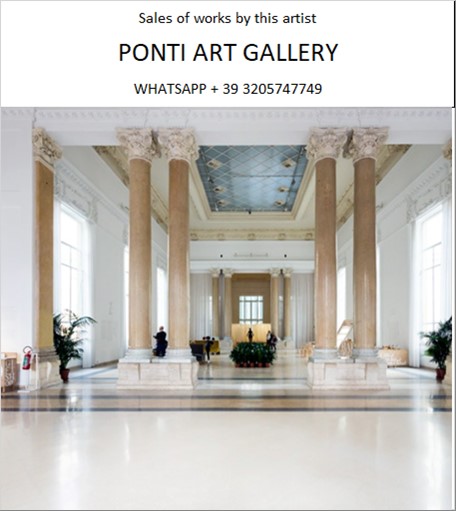Ponti Art Gallery is interested in buying and selling works
of art by this artist.

Khadim Ali Biography
Khadim Ali is a contemporary artist of Afghan descent, born in 1978 in Quetta, Pakistan, to a family of refugees from Bamiyan Province in Afghanistan. As a member of the Hazara ethnic minority, Ali's life and work are deeply influenced by the themes of persecution, exile, and the destruction of cultural heritage. His artistic journey is a testament to resilience, innovation, and the power of storytelling through visual art.
Ali's early exposure to the rich tapestry of Persian epic poetry, particularly Ferdowsi's 10th-century work "Shahnameh" (Book of Kings), played a pivotal role in shaping his artistic vision. His grandfather, a Shahnameh singer, introduced him to the stories and miniature paintings that illustrated the epic, igniting a lifelong fascination with the interplay between narrative, history, and art. This foundation laid the groundwork for Ali's exploration of contemporary events, such as the civil war in Afghanistan and the ongoing persecution of the Hazara people, through the lens of classical Mughal miniature painting techniques and motifs.
Ali's formal education in art began with studies in mural painting and calligraphy in Tehran, Iran, followed by a Bachelor of Fine Arts from the National College of Arts in Lahore, Pakistan, where he graduated with distinction in 2003. Under the mentorship of artist Imran Qureshi, Ali honed his skills in traditional miniature painting, a discipline that would become central to his practice. His work during this period was characterized by richly colored and detailed compositions that drew from both Eastern and Western art-historical sources.
In 2006, Ali's burgeoning career took him to Japan as a guest artist at the Fukuoka Asian Art Museum, marking the beginning of his international recognition. Four years later, in 2010, he relocated to Sydney, Australia, where he continued his studies and earned a master's degree in arts from the University of New South Wales in 2012. Australia became a new base for Ali, providing him with opportunities to expand his practice and engage with a global audience.
Ali's work is deeply rooted in the exploration of themes such as war, displacement, and the loss of cultural identity. He employs classical Mughal miniature methods to create new illustrations for the Shahnameh, using images from history, poetry, mythology, and politics to investigate the impact of the wars in Afghanistan, the persecution and exile of the Hazara people, and the broader implications of cultural destruction. His references to the Buddhas of Bamiyan, colossal statues destroyed by Taliban extremists in 2001, underscore the profound loss of heritage and identity experienced by his community.
Throughout his career, Ali has participated in significant international exhibitions, including the Venice Biennale in 2006, Documenta in Kassel, Germany, in 2012, and the Sharjah Biennial in 2019. His work has been included in curated exhibitions that showcase the diversity of Muslim Australian identities, such as "Waqt al-tagheer: Time of change" at ACE Open, Adelaide, as part of the Adelaide Festival. Ali's art is held in the collections of prestigious institutions like the Sharjah Art Foundation and has been featured in solo and group exhibitions worldwide.
Ali's practice has evolved to include a variety of media and scales, from traditional miniature paintings to large-scale tapestries and installations. His exhibition "Invisible Border" at the Institute of Modern Art in Brisbane, Australia, is a testament to this expansion, exploring the normalization of war and the experiences of refugees through a body of work that includes a nine-meter-long tapestry. This exhibition, among others, highlights Ali's ability to document moments in history and personal narratives through a visual diary that transcends traditional artistic boundaries.
Despite the global acclaim, Ali remains deeply connected to his roots and the ongoing struggles of the Hazara community. He maintains a studio in Kabul and harbors a dream of establishing an arts community in Bamiyan, envisioning a space for artistic residency and cultural exchange that is non-ideological and inclusive. Through his art, Ali continues to navigate the complexities of identity, displacement, and resilience, offering a poignant commentary on the human condition and the enduring power of storytelling.
Khadim Ali Quotes and Sales of
Works
Ponti Art Gallery selects and deals with paintings by the
artist. Upon request, we provide free estimates and
evaluations, communicate prices, quotations, and current
market values.
If you are interested in BUYING or SELLING works by the
artist, contact us immediately.
If you wish to sell or receive an evaluation of the
works:
Send us a frontal photo of the painting, one of the back,
and one of the signature. Also, indicate the dimensions of
the work. Inform us about the purchase origin of the work
and any kind of available documentation (purchase
receipts, certificates of authenticity, publications). One
of our operators will respond to you on the same day. We
guarantee maximum confidentiality and extreme
professionalism.
If you wish to purchase works by the painter: Contact us
and let us know your request. We will inform you about the
available works. We also offer the possibility to
subscribe to our NEWSLETTER, through which you will be
informed at the beginning of each month about the latest
acquisitions of the art gallery.
You can send us pictures of the work:
